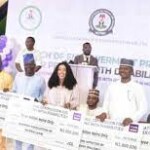By Gideon Oladimeji
Following a N37-billion fraud allegation that recently bubbled up in the Ministry of Humanitarian Affairs and Poverty Alleviation, former Minister Sadiyat Umar-Farouq and her officials immediately came under fire. Now her successor Betta Edu and her enablers across departments and agencies also stand suspect: one deal she authorized could have further plundered the ministry.
As expected, their honeypot is the social security fund for vulnerable Nigerians, which include people with disabilities; and the modus operandi remains manipulation of the public financial regulations.
Officials and members of the disability community ER spoke to agreed it is time to look into the finances of the ministry in general, and the National Commission for Persons with Disabilities (NCPWD) in particular.
“What is going on in the ministry remains an allegation,” said Barrister Lukman Salami, chairman, the Nigeria Association of the Blind (NAB), Lagos. “But now that the EFCC has decided to look into the allegation, we believe it should take a holistic approach. We’ve been demanding value for the money the disability commission claims it spends.”
The chairman of the Ifako Ijaiye LGA chapter of the same association hasn’t seen anything strange in how the entire ministry is carrying on
“The ministry was created legally for corruption, and nothing they do is accounted for,” Isaac Oluwayinka told ER.
With the help of the culture of impunity that pervades the ministry, a sum of N585 million is now up in the air. And the supposed recipients keep waiting on the promise of a renewed hope the President Bola Tinubu administration brought them.
The amount, laid by for provision of grants to vulnerable groups in Lagos, Cross Rivers, Ogun, and Akwa Ibom last year, obviously lacked a plan for disbursement. A similar malaise of poor procurement plan afflicts the National Commission for Persons with Disabilities (NCPWD) under the ministry. Under its Executive Secretary James Lalu, the agency paid N7.8 million to DAPS Global Security, a firm (from his home state Plateau) that bid for no contract—one of the many 2023 contract awards the agency has refused to account for.
Minister Edu, in a memo that went viral January 4, asked Accountant General of the Federation Oluwatoyin Madein to transfer the millions of naira into a private account of Oniyelu Bridget. Edu's aide said Bridget is the “project accountant” for the Grants to Vulnerable Groups (GVGs).
Section 713 of the Financial Regulation 2009 states: Personal money shall in no circumstances be paid into a government bank account, nor shall any public money be paid into a private bank account.
But Edu’s office has defended the impunity.
“It is legal in civil service for a staff, the project accountant, to be paid and use the same funds legally and retire the same with all receipts and evidence after the project or programme is completed,” said Rasheed Zubair, the special assistant on media and publicity to the minister.
The media handler was trying to spin Section 716 which permits transfer of small amounts of cash to officers “authorized to keep bank accounts”. That happens within the ministry.
Edu, too, has gone on ranting like a martyr, alleging persecution, and parrying the weightier matter of the law.
“The challenges we face only strengthen our resolve to serve with integrity…,” she said in a Facebook post on January 5.
But the regulation that forms the basis of integrity in public finance, in the second clause of the section, says, “An officer who pays public money into a private account is deemed to have done so with fraudulent intention.”
This probably concerns the AGF more. And she has responded.
According to her, her office received the request from Edu, but didn’t act.
“In such situations, payments are usually processed by the affected ministries as self-accounting entities, and no bulk payment is supposed to be made to an individual account in the name of Project Accountant,” Madein said in a statement her office issued on the same day Edu broke her silence.
The AGF then advised MDAs to follow due process.
Days ago, the National Coordinator of the National Social Investment Programmes Agency (NSIPA), Halima Shehu, faced EFCC’s interrogation (and detention) for gaming that process, and misappropriating N44bn. The anti-graft commission eventually tracked and froze N30 billion of the total stash.
Of the unofficial figure of 35 million PWDs in Nigeria, only about 300,000, which stood at 4 percent of the database, as of last August, have been registered with the National Agency for Social Safety Nets Coordinating Office (NASSCO). It is not even certain the handful have been benefitting from NSIPA’s programmes, including the Cash Transfer Scheme and the GVGs.
The disability commission that ought to ensure adequate representation of PWDs in the NASSCO database has no idea of how many they are.
Yet, as ER reported, the commission has been budgeting for data gathering (N170m) and digital disability certificates (N140m) for three consecutive years. Owing to procurement irregularities and impunity, none of these and other projects it awarded to unqualified contractors have succeeded. And the agency would not account for them.
According to Salami, whatever the commission claims it did with the billions it has spent in four years since its set-up—all is based on the charity approach. And the Nigerian disability community decries such model. “Members of my cluster and the community are not feeling it,” he said.
Oluwayinka even wondered what the supervising ministry itself can achieve when it has no disaggregated data of the people it’s supposed to serve.
Many disability analysts and other PWDs foresaw some of the shenanigans going on in the ministry. And they expect not much from the NCPWD itself. Not when the Discrimination Act puts it under the Presidency, but it has been operating illegally elsewhere.
Of the eight agencies and commissions under the ministry, only three have direct responsibilities to disability management and poverty reduction in Nigeria. Two of them—the NSIPA and the NASSCO—have come under scrutiny now, along with their supervising ministry.
“Asking to probe the third one NCPWD is even an understatement,” Oluwayinka said, though he believes nothing will come out of it.
His state chairman Salami insisted the probe should focus more on the disability commission, and other anti-graft agencies like the ICPC should move in, too.
“If we talk of humanitarian affairs, we talk about the vulnerable groups. And anywhere in the world, the disability community is one of the most vulnerable groups.”
Other disability cluster leaders might not hold a similar view.
Since the allegations blew into the open, only other CSOs outside of disabilities have called for Edu’s head. Most of the organistations of people with disabilities (OPDs) have been mute.
A cluster head told ER he’s been out of the country, and not in a position to comment. Even the umbrella body of all the OPDs, the Joint Organisation of PWDs (JONAPWD), has yet to speak officially.
Chances are low it will call on the EFCC to widen its probe to the NCPWD, the centre of humanitarian affairs for Nigerians with disabilities.







